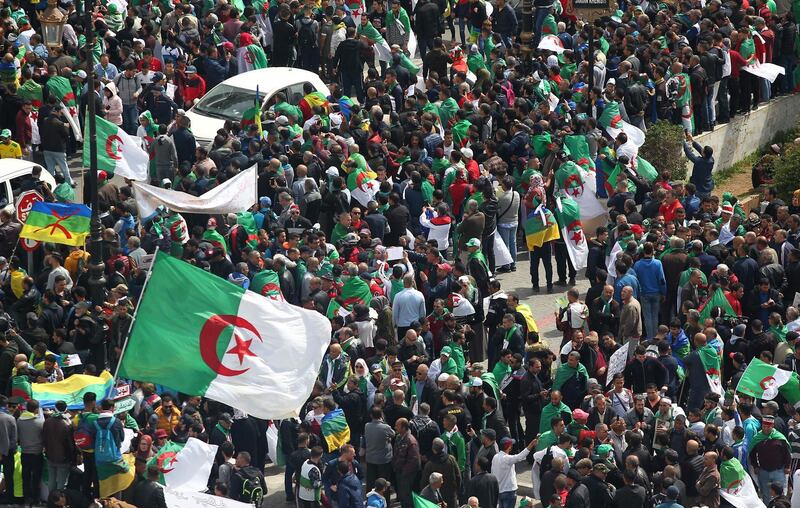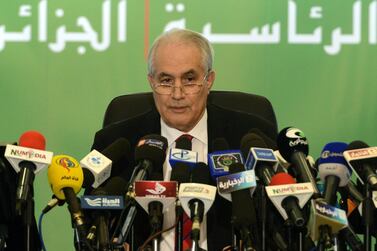Algeria's army chief has said that they are considering all options to resolve a national political crisis but that “time is running out” after weeks of protests unseated the two-decade rule of Abdelaziz Bouteflika.
Lt Gen Ahmed Gaed Salah's remarks were the strongest indication yet that the military, which has said it supports a transition period after the April 2 resignation of Mr Bouteflika, is losing patience.
In a speech broadcast on state television from a military base in the central town of Ouargla, Lt Gen Salah urged protesters who have been gathering since February 22 to avoid violence. Recent mass demonstrations have descended into scuffles with officers who responded with tear gas and water cannon.
"All options are open in the pursuit of overcoming the different difficulties and finding a solution to the crisis as soon as possible, in a way that serves our nation’s interests without regard to individual interests," Lt Gen Salah said.
He did not specify what measures the army could take, although he added that "we have no ambition but to protect our nation."
The army patiently monitored the mostly peaceful protests that sometimes swelled to hundreds of thousands of people.
But Lt Gen Salah intervened when Mr Bouteflika sought to extend his fourth term, declaring him unfit for office in a bid to avoid prolonged turmoil.
Parliament named an interim president and a July 4 election date was set in a transition the army said it would support.
Mr Bouteflika's departure failed to placate many Algerians who want to topple the old guard and its associates. Protesters want a clean break with the ruling elite – veterans of the war of independence against France, the ruling party and oligarchs – and sweeping democratic reforms.
Analysts say the army has been acting within the framework of the constitution to avoid giving any impression of a coup.
In the early 1990s, the military cancelled an election Islamists were poised to win, triggering a civil war that killed an estimated 200,000 people and ravaged Algeria.
"The army's leadership does not take any decision that does not serve the country and the people," said Lt Gen Salah, adding that some parties were not happy with the "peaceful protests".
The military head accused a former intelligence chief of trying to undermine the transition in a clear reference to Gen Mohamed Mediene, a spy chief dubbed "Algeria's God" because many saw him as the real authority.
"I send to this person a final warning," said Lt Gen Salah.
"And in case he persists in his actions, firm legal measures will be taken against him."
Mr Bouteflika fired Mr Mediene in 2015 in an attempt to weaken the intelligence services, but he is still seen as one of the most powerful figures in Algeria.
Mr Bouteflika, rarely seen in public since a stroke in 2013, also worked for years to ease the generals' clout and make the presidency more powerful by sacking dozens of top officers.
But the army is still the most powerful institution in Algeria. It has swayed politics from the shadows for decades and is expected to help guide the transition process.
Earlier on Tuesday, the chairman of the Constitutional Council, Tayib Belaiz, quit his post. That followed calls for his resignation by protesters who say he is part of a ruling elite they want abolished.
Mr Belaiz submitted his resignation to interim President Abdelkader Bensalah. He was replaced by Kamel Fenich, a little-known judge and member of the council, state TV added.
Thousands of demonstrators marched through the streets of Algiers and in cities across the country on Tuesday, calling for radical change in the eighth week of mass protests.
Mr Belaiz's departure could herald that of other senior political figures who protesters want removed.
These include Mr Bensalah, who was appointed interim president after Lt Gen Salah managed Mr Bouteflika's exit.






